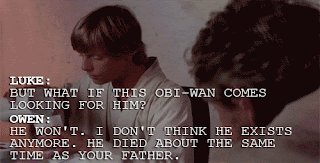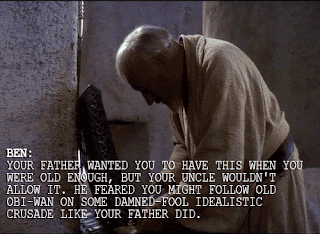 We would all do well to remember when Return
of the Jedi showed Obi-Wan Kenobi to be a brazen liar. The moment comes when the Force ghost of Obi-Wan Kenobi—who is supposed to be a good guy—sits down on a fell tree in the swamps of Dagobah to rationalize his fabrication about the fate of Luke Skywalker’s father. While Obi-Wan had said that Darth Vader killed Anakin Skywalker, it turns out that Darth Vader is
Anakin Skywalker. But, Obi-Wan says, he was actually telling the truth because, from his perspective, Anakin Skywalker's turn to the Dark Side of the Force was the same as becoming a different person. He even lamely tries to boost this attempt at weaseling his lie into the truth by tacking on a vague aphorism about "point of view" as if this were some sort of lesson in wisdom:
We would all do well to remember when Return
of the Jedi showed Obi-Wan Kenobi to be a brazen liar. The moment comes when the Force ghost of Obi-Wan Kenobi—who is supposed to be a good guy—sits down on a fell tree in the swamps of Dagobah to rationalize his fabrication about the fate of Luke Skywalker’s father. While Obi-Wan had said that Darth Vader killed Anakin Skywalker, it turns out that Darth Vader is
Anakin Skywalker. But, Obi-Wan says, he was actually telling the truth because, from his perspective, Anakin Skywalker's turn to the Dark Side of the Force was the same as becoming a different person. He even lamely tries to boost this attempt at weaseling his lie into the truth by tacking on a vague aphorism about "point of view" as if this were some sort of lesson in wisdom:What could be a saving move on the part of Obi-Wan Kenobi becomes a non-starter for the rest of the film. There is no moment with Luke Skywalker realizing for himself that perspective alters truth. There is no point where Luke—much less anyone— sees that alternative facts lead to different conclusions that reflect one's ideological assumptions. Rather, in Star Wars, it is when truth has been compromised that this sort of point-of-view shift comes about. What we are left with, then, is Obi-Wan Kenobi using this vague aphorism as an excuse to get himself out of having to own up to his lie.
Some might argue that this apparent dishonesty is a byproduct of the films' creators lacking any grand vision for the series, leading to continuity mistakes and discrepancies in the Star Wars movies from changing things haphazardly. But, as I will demonstrate, the better explanation is that the Jedi have a firm habit of misleading with lies and half-truths.
Welcome to the first of my three-part series on Jedi lies and the lying Jedi who tell them.
The Lie of Opportunity
A New Hope makes it clear that, even before going off on his Jedi adventure, Luke Skywalker had been living with lies. His Uncle Owen, desiring to keep Luke safe at the moisture farm, continuously stalls Luke’s efforts at joining his friends at "the Academy" and also makes nakedly deceptive attempts at keeping Luke from interacting with Obi-Wan Kenobi:This environment of deception creates an opening for "Old Ben" Kenobi to easily gain Luke's trust. After he disproves Owen's transparent lies by explaining that he himself is Obi-Wan, the shaky credibility Luke had for his caretaker has been undermined, creating a trust vacuum for Luke and setting Obi-Wan up to become a new trusted figure with little effort.
Obi-Wan takes this opportunity to gain Luke's trust by replacing Owen's lies with those of his own making. Here is how Obi-Wan Kenobi characterizes Owen Lars's relationship with Anakin Skywalker:
The picture we get here is of an Anakin Skywalker about Luke's age who was raised on Tatooine along with his brother, Owen. Presumably, Anakin Skywalker left Tatooine when he was a young man and wished to take part in the Clone Wars, perhaps driven by Jedi duty or due to some other value that made involvement in interstellar affairs important to him. Meanwhile, diffident Owen wanted to just work on the moisture farm and keep Anakin on Tatooine, as he does with Luke.
However, the most basic plot outline of The Phantom Menace shows this to be a fabrication. Anakin Skywalker was taken from Tatooine as a small boy, compelled more by a desire to escape enslavement than any sense of justice or duty, much less awareness about galactic affairs. There were no clone wars at the time and Owen, it turns out, is half-brother to Anakin through a marriage that wouldn’t even take place for several years (as we see has happened by Attack of the Clones). Not only were the two of them strangers when Anakin left to become a Jedi, but in the brief amount of time they did see each other, there was no clashing of ideals or even any clashing at all.
Watching Big Brother
This line of deception reveals the Jedi Master's motives: Obi-Wan Kenobi wishes to mislead Luke into believing that Darth Vader and Anakin Skywalker are different people; because his plan involves Luke killing Vader and Palpatine, avoiding the revelation of Vader's identity keeps Luke on track with this plan (at least until his Jedi training would allow his sense of duty to outshine any reluctance to kill his own father). However, Kenobi's lies go beyond this by misleading Luke regarding how Anakin left Tatooine and Anakin’s relationship with Owen. Why would he do that? The answer to this comes about with the further weaving of a fanciful tale when Obi-Wan pulls out Anakin’s lightsaber:
Obi-Wan Kenobi is trying to trick Luke into abandoning his obligations with an implied promise of adventure. The first clause of this line is a fabrication. Not only was there no point that Anakin Skywalker expressed that he wanted his son to have his lightsaber, there was no indication of what he wanted for any of his children. He certainly had no opportunity to tell Obi-Wan Kenobi or his half-brother, Owen, since he and Padmé kept their marriage secret.
While this might seem like a strange thing to make up, Obi-Wan's lie makes sense in the overall narrative that he is constructing for Luke. Luke's Uncle Owen has been suppressing his efforts to leave the moisture farm and the lies that Obi-Wan tells him make it seem as though Owen did the same thing to his father, Anakin. Obi-Wan has reframed Luke's experiences from a protective caretaker looking out for the safety of his charge to that of a contrast between Anakin's high-minded idealism and Owen's cowardice. This is designed to manipulate Luke into abandoning his family, something the Jedi typically have no problem with anyway.
By reframing Owen's behavior in this way, Obi-Wan can now weasel in bits of truth: the rest of the above line implies that he and Owen had a falling out regarding Luke's involvement in galactic affairs. Owen, being Luke's guardian, must have somehow forbidden Obi-Wan from even contacting Luke, much less training him to be a Jedi. This seems to be an accurate characterization (though, again, for different reasons than Obi-Wan implies) because it coheres with Owen's failed attempts to dissuade Luke from finding Obi-Wan.
Why are Jedi taught like this?
We can also surmise that this disagreement between Obi-Wan Kenobi and Owen Lars happened long ago because, were Luke to be trained as a Jedi, Obi-Wan would have started much earlier. Remember that, in Empire Strikes Back, Yoda remarks that Luke's ripe old age of 21 is a problem for his training:
It turns out that this is an understatement. In The Phantom Menace, even nine-year-old Anakin Skywalker is too old:
...
If Jedi are normally trained at a much earlier
age and Obi-Wan has not started training Luke already, then it is likely that
there really was a disagreement between Owen and Obi-Wan that prevented the
latter from starting Luke’s Jedi training.
 |
| Please accept this placeholder image until relevant shots from the not-yet-confirmed Obi-Wan Kenobi spin-off film become available |
Given that conflict, Obi-Wan Kenobi is ready to snatch at the first opportunity to begin this training process, even if it is much later than he would have liked. If we are to understand Obi-Wan's character as consistent, then his mantra about point of view from Return of the Jedi can inform his rhetorical tactics in this scene: Obi-Wan is trying to shift Luke's "point of view" so that he will abandon his familial obligations. Unsurprisingly, Obi-Wan desperately makes this move right after he receives Leia’s summons to Alderaan, when he says:
Having laid the groundwork of deception, Obi-Wan strategically words his call to action in a way that presumes Luke has agreed to come, rather than as a request that Luke join him (this is what's called the assumptive close). This assumption is the icing on top of the deceptive cake he has baked to butter Luke up and get him to leave his protective uncle; Obi-Wan has told Luke of an adventurous father who would have wanted him to follow in his footsteps (something he has no way of knowing) were it not for the overly confining Uncle Owen (something that Luke likely perceives himself, making this a shared connection with his father). He's even given Luke a cool weapon, which would also help subconsciously ease him into accepting the call to adventure.
What is the result of lying like this?
We now understand that Obi-Wan, desperate to begin training Luke Skywalker to become a Jedi and kill his own father, wastes no time in trying to trick Luke and get him away from Owen as quickly as possible. We thus see two interconnected motivations: start training Luke to become a Jedi and set him up to kill his own father.



![Maury Povich fact checks Obi-Wan Kenobi MAURY POVICH: You said that Owen opposed Anakin's involvement with the Clone Wars. The prequels determined that this was a lie.]](https://blogger.googleusercontent.com/img/b/R29vZ2xl/AVvXsEh0a0esy72X9crA8RDJ_xQt7ovDkiUqsOUyCYgGwO5jnhDyw0-AyBwU8hF60YA0pfUURqmGxy2tHBSsKdthgd9p8ItORcQlxAxT_pBUVxJ1hh3Ix51QjiJkhNeTlJPa_FXEmF_X/s320/maury-Owen-Clone-wars.gif)






1 comment:
Good article. However, it would have been simpler to describe Anakin and Owen as "step-brothers".
Post a Comment